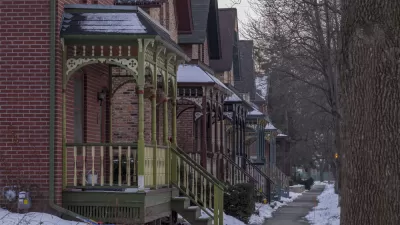After losing a court battle with environmental groups, the city must revert to the land use regulations in its 2030 plan.

The Minneapolis 2040 Comprehensive Plan, once hailed by housing reform advocates for its elimination of single-family zoning, has been officially shelved as a court deadline passed last weekend, reports Tommy Wiita for Bring Me the News.
The city now has to revert to its 2030 plan after environmental groups successfully challenged the plan in court under the Minnesota Environmental Rights Act (MERA), arguing that the land use changes in the plan would harm local ecosystems and pollute waterways.
“Some of the housing developments put forward under the 2040 plan will have to change under the old ordinances, causing some uncertainty for multiple projects,” Wiita adds, noting that, “since [Minneapolis 2040] was implemented three years ago, the city has seen an uptick in construction that has kept housing and rental prices more affordable at a time when inflation in other cities has skyrocketed.” The city says it will lose almost $10 million in funds already invested in affordable housing projects that will no longer be permitted.
According to an article by Susan Du in the Star Tribune, not all environmental groups agree with the ruling. “The Sierra Club, which filed an amicus brief in support of 2040, argued the plan's goals of increasing housing density along transit corridors would reduce carbon emissions by eliminating the need to own a car.”
FULL STORY: Minneapolis sets aside 2040 Comprehensive Plan after judge ruling goes into effect

Planetizen Federal Action Tracker
A weekly monitor of how Trump’s orders and actions are impacting planners and planning in America.

Maui's Vacation Rental Debate Turns Ugly
Verbal attacks, misinformation campaigns and fistfights plague a high-stakes debate to convert thousands of vacation rentals into long-term housing.

San Francisco Suspends Traffic Calming Amidst Record Deaths
Citing “a challenging fiscal landscape,” the city will cease the program on the heels of 42 traffic deaths, including 24 pedestrians.

Amtrak Rolls Out New Orleans to Alabama “Mardi Gras” Train
The new service will operate morning and evening departures between Mobile and New Orleans.

The Subversive Car-Free Guide to Trump's Great American Road Trip
Car-free ways to access Chicagoland’s best tourist attractions.

San Antonio and Austin are Fusing Into one Massive Megaregion
The region spanning the two central Texas cities is growing fast, posing challenges for local infrastructure and water supplies.
Urban Design for Planners 1: Software Tools
This six-course series explores essential urban design concepts using open source software and equips planners with the tools they need to participate fully in the urban design process.
Planning for Universal Design
Learn the tools for implementing Universal Design in planning regulations.
Heyer Gruel & Associates PA
JM Goldson LLC
Custer County Colorado
City of Camden Redevelopment Agency
City of Astoria
Transportation Research & Education Center (TREC) at Portland State University
Jefferson Parish Government
Camden Redevelopment Agency
City of Claremont





























